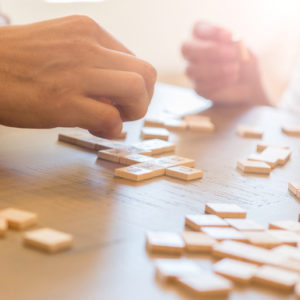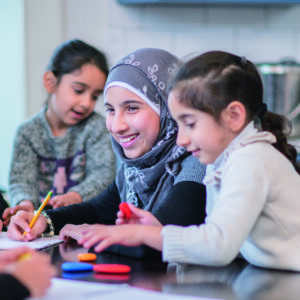Easy Activities To Strengthen Your Child’s Brain

 As many families across the United States enter a month of social distancing and stay-at-home orders, we’re all in need of more ideas to help us keep kids entertained and educated. Sara Schlagel, LSCSW, is Vice President of Behavioral Health Services at Camber (previously KVC Hospitals) where she oversees program innovation and employee training for our children’s mental health treatment centers. In this blog, Sara explains a few fun activities families can do together to help kids develop stronger brains and executive thinking skills.
As many families across the United States enter a month of social distancing and stay-at-home orders, we’re all in need of more ideas to help us keep kids entertained and educated. Sara Schlagel, LSCSW, is Vice President of Behavioral Health Services at Camber (previously KVC Hospitals) where she oversees program innovation and employee training for our children’s mental health treatment centers. In this blog, Sara explains a few fun activities families can do together to help kids develop stronger brains and executive thinking skills.
Learn about the 5 things every child needs for good mental health here!
What Are Executive Thinking Skills?
Executive thinking skills determine a person’s ability to solve problems, focus, follow directions, plan, juggle multiple tasks, make decisions, and think critically. These skills help us achieve success every day in school, at work, or managing daily responsibilities. Heightened levels of stress, adversity, and/or trauma can hinder a child’s development of these skills and underdeveloped executive functioning skills make it hard to focus, follow directions, regulate emotions, and more.
It’s important to understand that the brain isn’t just born, it’s built. Doing simple brain strengthening exercises on a regular basis helps kids build the executive thinking tools they need to have healthy interpersonal relationships, do well in school/at work, and make good decisions. Practicing these skills makes them stronger well into adulthood.
Brain Strengthening Activities
These exercises can be done with items already in your home and are fun for the entire family! When practicing executive thinking exercises with your child, consider these suggestions:
- Start with simple activities and slowly increase their complexity until the activity becomes challenging
- Be patient and encouraging with your child
- Take breaks as needed
- If the activity doesn’t work as intended, try a different way
- Let your child give feedback about the activity and take it into consideration when choosing another exercise
 Now You See It
Now You See It
This individually-focused activity builds skills like memorization, prioritization, problem-solving and focus.
Instructions:
- Put 10 to 20 items on a large tray or surface and cover them with a cloth.
- When your child is ready, remove the cloth and give them one minute to view the items.
- After the minute is up, cover the items and have your child write down the items they saw on a piece of paper.
You can make this activity harder by increasing the number of objects, asking for more specific details about the objects (colors, words on objects, location, etc.), or shortening the amount of time the items can be viewed.
 Crossword Categories
Crossword Categories
This individually-focused activity builds skills like focus, critical thinking, decision making and problem-solving.
Instructions:
- Have your child write down five different categories on slips of paper and place them in a bag. Examples of categories are animals, things to do on a vacation, sports teams, and countries.
- Then, have your child write down five different eight-letter words on slips of paper and place them in another bag.
- Next, you will pull an eight-letter word and one category out of the bags.
- Then ask your child to use each letter of the eight-letter word to create separate words related to the category.
Encourage your child to complete this activity without the use of the internet. To make this activity more challenging, increase the number of letters a word needs or encourage more complex categories.
 Story, Story
Story, Story
This family activity builds skills like creativity, focus, memorization, organization and planning.
Instructions:
- Place 15 to 20 random objects in a non-see-through bag.
- Instruct each person participating to reach into the bag and pull out one item.
- One person at a time, make up a story about the item you pulled out of the bag. Each person will add their story to the previous person’s story so that the group is creating one big story together.
- End the activity by repeating the story in full to the group.
To make this activity more challenging and allow for several rounds, let players recap the story before the next round. Encourage your family to get creative! Think outside of the box and don’t let the normal constrictions of an object limit you! For example, personify a paper clip and pretend you’re talking like a paper clip would.
About Camber (Previously KVC Hospitals)
For 30 years, Camber has helped thousands of kids and teens achieve mental health wellness through expert and compassionate treatment. Camber uses a patient-centered approach that works to heal the whole family unit when a child is struggling with depression, anxiety, suicidal thoughts, self-harming, the impacts of trauma, and other mental health needs. To learn more about our services including our internationally renowned expertise in trauma-informed care, visit cambermentalhealth.org or call us 24/7 at 913-890-7468.





